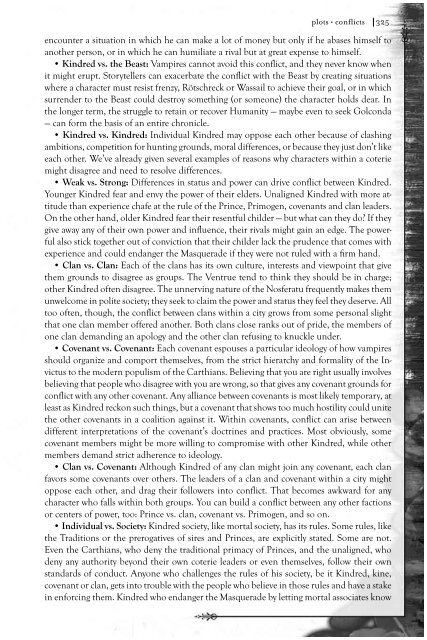Mind's Eye Theatre - Vampire The Requiem.pdf - RoseRed
Mind's Eye Theatre - Vampire The Requiem.pdf - RoseRed
Mind's Eye Theatre - Vampire The Requiem.pdf - RoseRed
Create successful ePaper yourself
Turn your PDF publications into a flip-book with our unique Google optimized e-Paper software.
chapter one: society plots of the • confl damned icts<br />
325<br />
encounter a situation in which he can make a lot of money but only if he abases himself to<br />
another person, or in which he can humiliate a rival but at great expense to himself.<br />
• Kindred vs. the Beast: <strong>Vampire</strong>s cannot avoid this confl ict, and they never know when<br />
it might erupt. Storytellers can exacerbate the confl ict with the Beast by creating situations<br />
where a character must resist frenzy, Rötschreck or Wassail to achieve their goal, or in which<br />
surrender to the Beast could destroy something (or someone) the character holds dear. In<br />
the longer term, the struggle to retain or recover Humanity — maybe even to seek Golconda<br />
— can form the basis of an entire chronicle.<br />
• Kindred vs. Kindred: Individual Kindred may oppose each other because of clashing<br />
ambitions, competition for hunting grounds, moral differences, or because they just don’t like<br />
each other. We’ve already given several examples of reasons why characters within a coterie<br />
might disagree and need to resolve differences.<br />
• Weak vs. Strong: Differences in status and power can drive confl ict between Kindred.<br />
Younger Kindred fear and envy the power of their elders. Unaligned Kindred with more attitude<br />
than experience chafe at the rule of the Prince, Primogen, covenants and clan leaders.<br />
On the other hand, older Kindred fear their resentful childer — but what can they do? If they<br />
give away any of their own power and infl uence, their rivals might gain an edge. <strong>The</strong> powerful<br />
also stick together out of conviction that their childer lack the prudence that comes with<br />
experience and could endanger the Masquerade if they were not ruled with a fi rm hand.<br />
• Clan vs. Clan: Each of the clans has its own culture, interests and viewpoint that give<br />
them grounds to disagree as groups. <strong>The</strong> Ventrue tend to think they should be in charge;<br />
other Kindred often disagree. <strong>The</strong> unnerving nature of the Nosferatu frequently makes them<br />
unwelcome in polite society; they seek to claim the power and status they feel they deserve. All<br />
too often, though, the confl ict between clans within a city grows from some personal slight<br />
that one clan member offered another. Both clans close ranks out of pride, the members of<br />
one clan demanding an apology and the other clan refusing to knuckle under.<br />
• Covenant vs. Covenant: Each covenant espouses a particular ideology of how vampires<br />
should organize and comport themselves, from the strict hierarchy and formality of the Invictus<br />
to the modern populism of the Carthians. Believing that you are right usually involves<br />
believing that people who disagree with you are wrong, so that gives any covenant grounds for<br />
confl ict with any other covenant. Any alliance between covenants is most likely temporary, at<br />
least as Kindred reckon such things, but a covenant that shows too much hostility could unite<br />
the other covenants in a coalition against it. Within covenants, confl ict can arise between<br />
different interpretations of the covenant’s doctrines and practices. Most obviously, some<br />
covenant members might be more willing to compromise with other Kindred, while other<br />
members demand strict adherence to ideology.<br />
• Clan vs. Covenant: Although Kindred of any clan might join any covenant, each clan<br />
favors some covenants over others. <strong>The</strong> leaders of a clan and covenant within a city might<br />
oppose each other, and drag their followers into confl ict. That becomes awkward for any<br />
character who falls within both groups. You can build a confl ict between any other factions<br />
or centers of power, too: Prince vs. clan, covenant vs. Primogen, and so on.<br />
• Individual vs. Society: Kindred society, like mortal society, has its rules. Some rules, like<br />
the Traditions or the prerogatives of sires and Princes, are explicitly stated. Some are not.<br />
Even the Carthians, who deny the traditional primacy of Princes, and the unaligned, who<br />
deny any authority beyond their own coterie leaders or even themselves, follow their own<br />
standards of conduct. Anyone who challenges the rules of his society, be it Kindred, kine,<br />
covenant or clan, gets into trouble with the people who believe in those rules and have a stake<br />
in enforcing them. Kindred who endanger the Masquerade by letting mortal associates know



